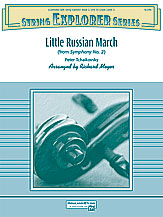Little Russian March (from Symphony No. 2)
Buy this item (in stock)
Product ID: HE2 SE 24941
By Pjotr Illych Tchaikovsky
Publisher:
Highland Etling
Arranger:
Meyer
Series:
String Explorer Series
Genre:
Romantic Era
Line Up:
String Orchestra
Duration:
2:30
Level: 2
Set & Score
This item is in stock
About this item
It was while visiting his sister in "Little Russia" (an area of Southern Russia known better as the Ukraine) that Tchaikovsky got the idea to compose a new symphony based on songs he heard from the inhabitants. The first performance of the new symphony (his second) took place in Moscow in 1873, and was revised eight years later. This march (the symphony's second movement) is actually the tragic wedding march from Tchaikovsky's discarded opera "Undine". Simple chromatics, hooked bowings, and staccato and marcato bow styles make this charming work an excellent teaching piece for young orchestras. Perfect for contests!
Reviews and rating
No review available, be the first to write one!

Composer
Pjotr Illych Tchaikovsky (1840-1897)
Pyotr Ilyich Tchaikovsky (May 7, 1840 – November 6, 1893) was a Russian composer of the Romantic era. His wide-ranging output includes symphonies, operas, ballets, instrumental, chamber music and songs. He wrote some of the most popular concert and theatrical music in the classical repertoire, including the ballets Swan Lake, The Sleeping Beauty and The Nutcracker, the 1812 Overture, his First Piano Concerto, his last three numbered symphonies, and the opera Eugene Onegin.
Born into a middle-class family, Tchaikovsky was educated for a career as a civil servant, despite his obvious musical precocity. He pursued a musical career against the wishes of his family, entering the Saint Petersburg Conservatory in 1862 and graduating in 1865. This formal, Western-oriented training set him apart from the contemporary nationalistic movement embodied by the influential group of young Russian composers known as The Five, with whom Tchaikovsky's professional relationship was mixed.
More info about the composer...



 Click above to view samples
Click above to view samples
